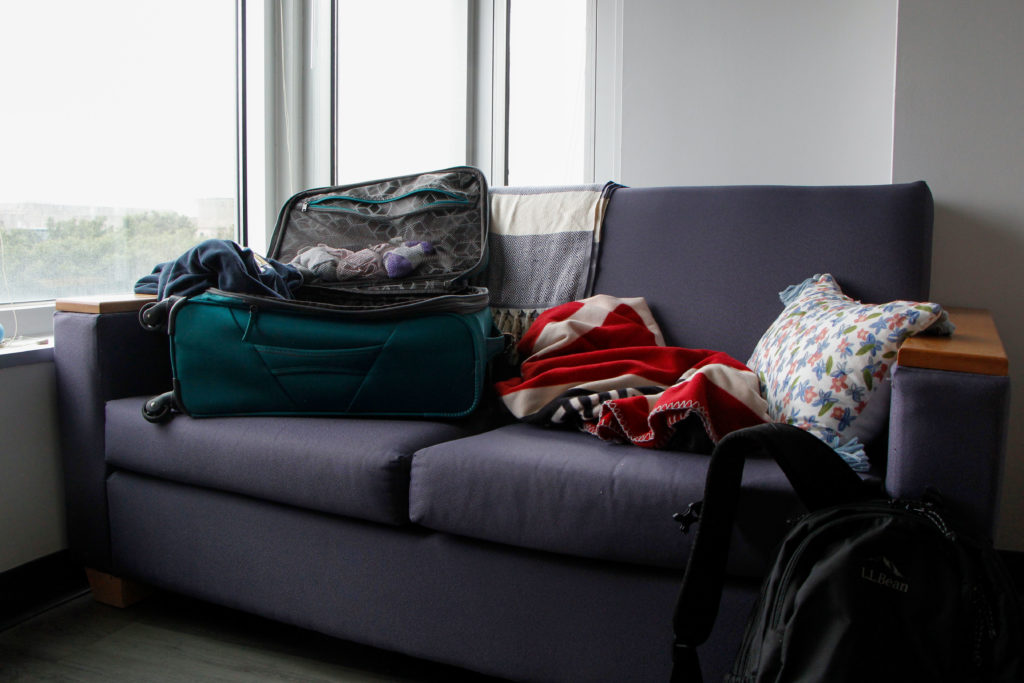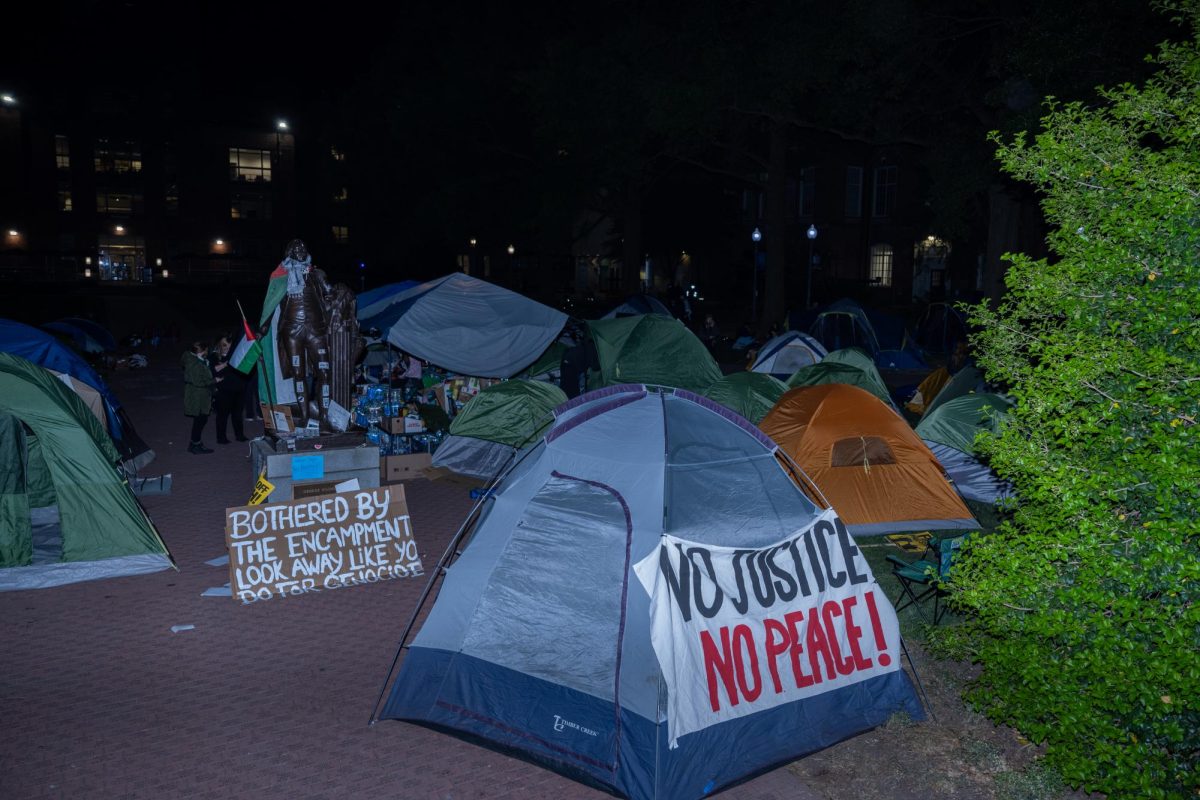When sophomore Rachel Zhao’s roommate tested positive for COVID-19 earlier this month, she threw a few days’ worth of clothes and belongings into a bag and left her two-person District House room, unsure of where she would go next.
For the next five days, she slept on spare mattresses in the rooms of friends until GW cleared her roommate from isolation.
“I just threw everything in a bag,” Zhao said.
Zhao’s week of crashing in rooms around campus comes as a byproduct of the University’s isolation protocol updated in August, which no longer relocates residential students who test positive to separate isolation housing. Five students said they have paid for hotels to isolate themselves, slept on friends’ couches and spare mattresses to avoid additional exposure or slept just feet away from a sick roommate as a result of the new protocol.
The new University guidelines recommend students stay with family or friends, book a hotel room or remain in their room while keeping a distance from their infected roommate. Officials said Centers for Disease Control and Prevention guidance no longer considers college residence halls as “high-risk areas” because the usual age group of undergraduate students is unlikely to experience severe cases of COVID if they’re vaccinated.
The CDC guidance that officials referenced also instructs COVID-positive individuals to isolate themselves from others and to not go places where they cannot wear a mask.
Zhao said she stayed with two different friends in District House while she waited for her roommate to complete her isolation period. She said she was forced to improvise her living situation after the positive test because she and her roommate had not made a plan for what to do if one of them got COVID.
She said she tried to minimize any trips made back to her room to grab items to avoid catching the virus in the small studio space. She said she forgot shampoo and other essential toiletries in her rush to leave, so she borrowed them from friends instead of returning to her room.
“I feel like you don’t want to really go back into a room that’s being lived in by someone who has COVID,” she said.
Zhao said officials should provide optional isolation housing for students who test positive, especially for those who are unable to stay with friends. She said she understands hotels may be out of budget for GW, but students should have the choice to protect their health.
“I don’t think everybody would take the option,” Zhao said. “Even if I was given the option, I think I would have chosen to stay with my friends just because it’s more convenient for me.”
Officials implemented isolation housing during the 2021-22 academic year to isolate COVID-positive students from their roommates in an effort to contain the spread of COVID on campus.
The University reserved beds last spring in Yours Truly – a local hotel north of Washington Circle – for students isolating with COVID. Students who tested positive in the 2020-21 academic year isolated in residence hall rooms left vacant due to limited on-campus housing.
COVID cases in D.C. last spring with about 307.9 weekly positive tests reported in early May, but those totals have since dropped to about 85 weekly cases in the District currently. Officials have accordingly relaxed COVID policies and restrictions on campus, lifting the mask mandate outside of instructional settings, transportation and healthcare facilities last week, ending the biweekly asymptomatic testing requirement in June and shortening the isolation period for infected students from 10 days to five in May.
University spokesperson Josh Grossman declined to comment on the current status of GW’s isolation protocol, deferring to GW websites with guidance for residents who test positive for COVID. GW requires students to undergo at least five days of isolation as a measure to “separate” COVID-positive people from others, but the University does not offer separate housing.
Campus Living and Residential Education’s website states people who are sick should “limit” interactions and “sleep as far as possible away from each other” with beds spaced apart.
At least six of GW’s 12 peer schools ask students who test positive for COVID to isolate in place, while the University of Miami and the University of Southern California require all who test positive to move into separate isolation housing. Wake Forest University asks students who test positive to isolate in place but allows students at risk of severe disease from COVID to move into separate housing if their roommate tests positive.
Maryana Shnitser, a sophomore living in a Guthridge Hall studio, said she stayed at three different friends’ rooms for five nights while her roommate had COVID to avoid additional exposure in their shared bedroom, kitchen and bathroom. She said she did not have nearby family to stay with, and the cost of a hotel room would have been a financial burden.
“A lot of people offered their space as soon as I told them, which was really nice,” she said. “And I’m grateful to have those people, but I know that that’s not an option for everyone.”
Shnitser said she took “minimal” belongings from her two-person Guthridge Hall room, and moving from room to room each night was “uncomfortable.” She said she didn’t want to trouble the friends who were hosting her, so she’d try to find a new room after a few nights.
“I didn’t choose to stay with one person for too long so I didn’t impose on their space,” Shnitser said. “So I tried to limit it.”
Shnitser said officials should implement an isolation housing option for students who test positive because it’s unrealistic to put students in a living situation where they may have to live with a roommate infected with COVID-19.
“It just didn’t feel fair that me or another person, if they were in that position, would have to stay in a room where they would get sick, essentially, with something that impacts everyone differently,” Shnitser said.
Ava DelloRusso, a sophomore living in Shenkman Hall, said when she tested positive last week, she and her suitemates decided she would remain in the bedroom while her roommate would use the adjoining common room. She said her roommate slept on the couch for the first few nights before she decided to share the room with her at night even though DelloRusso had not completed her isolation period.
“I don’t have family that lives close to here, so it’s not like I can go pack up and go back home anywhere,” DelloRusso said. “So it was really like, what can I do? What can we do to make the situation as safe as possible while I’m still staying in the room?”
DelloRusso said she wears a mask at all times other than sleeping, disinfects shared surfaces and started to sleep backward on the bed with her head further away from her roommate. She said none of her roommates have tested positive since the new arrangement, but the close proximity of her roommates during her isolation period has been a source of anxiety.
“It’s pros and cons, where it’s nice that I didn’t have to completely uproot everything and go move somewhere,” DelloRusso said. “But at the same time, it brought a new stress level of constantly being concerned, like, ‘Oh, God, am I going to get somebody else sick?’”
Shea Carlberg contributed reporting.








